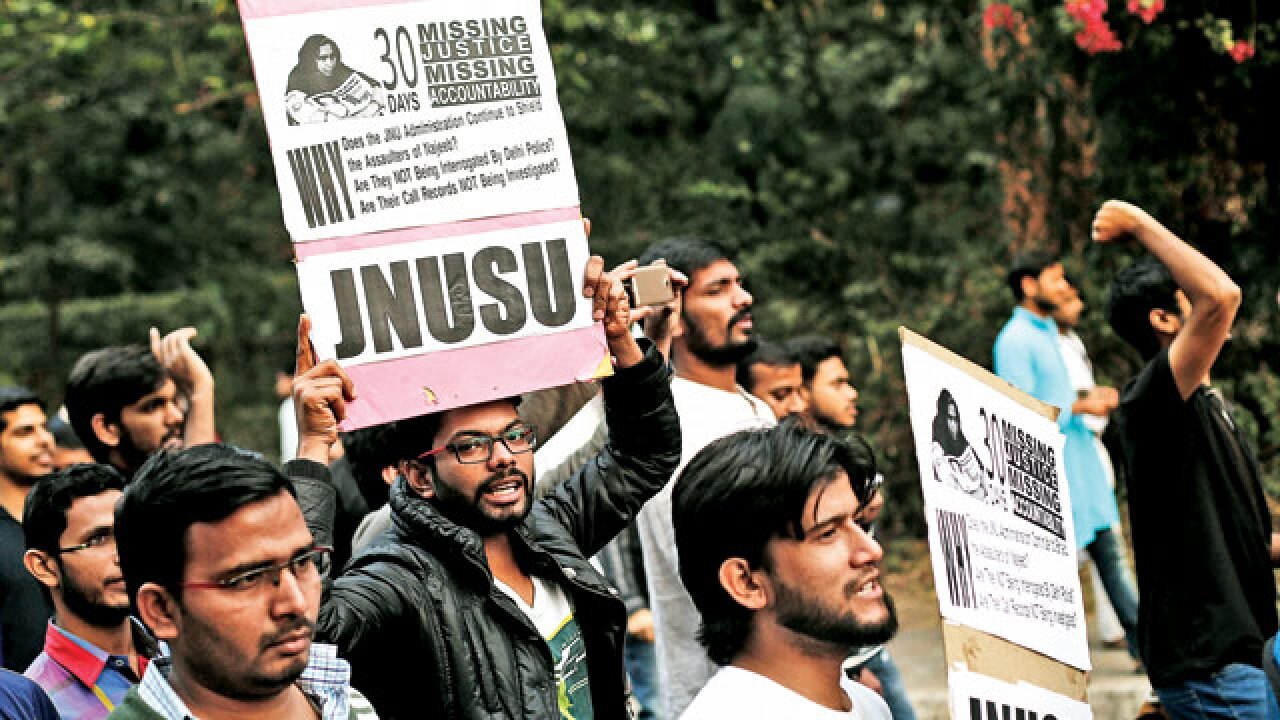
Saturday, 17th December: Around 11:30 am, when I was reading the rather abstruse Tantrasara by Abhinavagupta, the bell to the back entrance of my house suddenly rang. I peeped down from one of the windows to see who it was. To my surprise, a posse of policemen, some in plain clothes but with giveaway khaki trousers, were at my door.
“Jee?” I asked from above. One of them looked up, smiled, and said, “Sir, hum aapke ghar ki taalashi lena chahte hain (we need to search your house).” This was, to the say the least, rather unexpected. I cannot remember any of the homes I’ve occupied ever being searched, nor, for that matter, a policeman on duty ever enter. What did they expect to find? A huge haul of crisp, purple Rs 2000 notes, all neatly stowed in cardboard boxes and sealed with brown masking tape? I found myself a bit annoyed: “Why do you want to search the premises?” I asked. The cop looked abashed: “We are looking for Najeeb….”
The penny suddenly dropped. Najeeb Ahmed is the MSc Biotechnology student who disappeared on October 15, 2016 and has still not been traced. I almost laughed, “What? You are looking for him in my house?” The cop replied, “No, no, we are searching all the houses in JNU. It’s a High Court order.” I found that so bizarre. A house-to-house search for a missing student! Suppose he was actually on campus and he or those controlling him didn’t want him to be found, wouldn’t he run or be taken away when the cops entered the campus or even one house was searched?
The order simply didn’t make sense. I, however, invited the cops in. They wandered into the house half-heartedly, looked through all the rooms, even the bathrooms, opened a closet or two, peeked into the storeroom, then a couple of them went up to my terrace. Did they think he’d be hiding in the water tank? But soon they were trooping down the stairs, shrugging their shoulders. One of the officers shook my hand and said, “Sorry, Sir.” The two lady cops smiled and said, “Thank you, Sir.” I said, “How about some tea?” They replied, “No, no, let us find him first then we’ll have tea.”
Of course I wasn’t about to obstruct justice, but I wondered if the police had a warrant to enter my house. I even asked one of them. He said, “Hamare afsar neeche khade hain; woh aap ko samjhayenge (our officer is standing downstairs, he will explain it all to you).” He was very polite, but the truth was he had no warrant. Nor did he show me a copy of the High Court order. I realised that the freedoms we take so much for granted are actually quite fragile. The police can, on reasonable suspicion or with justifiable cause, actually search your home without a warrant. The relevant section of the Criminal Procedure Code is 165, the language of which even if not intent, is ambiguous.
I thought we were more vulnerable to such invasion of privacy in India. Again, I was wrong. In the US too, law enforcement officers can enter a home without a search warrant to make an arrest, look for a criminal, and investigate suspicious activity. Citizens are advised to cooperate not only to avoid unpleasantness, but also harassment or coercion.
Coming back to Najeeb, I discovered that a force of over 500 police had descended on the 1,000-acre JNU campus. The scale of the operation was as mind-boggling as baffling. To imagine that Najeeb would be hiding in the bush, undergrowth, or natural caves on campus, without being seen by anyone was so far-fetched. Then the sickening feeling that they might be looking for his body also crossed my mind. But pressing sniffer dogs into the operation more than three months after his disappearance would only lead to a cold trail.
As I told one of the policemen who came to my house, “If you really wanted to find out where he is, this should have been a covert operation. There should have been plainclothes people making discreet inquiries, watching the movements of his friends, monitoring phone calls.” He gave me a wry smile, “His mother cried in the High Court, so the judges ordered this. What can we do?”
Some time back, it was reported that the auto rickshaw driver who took him from JNU to Jamia Milia that fateful evening had been traced. Why, then, didn’t the investigating agencies search where he might have gone from Jamia? Why didn’t they contact his friends and acquaintances there? Without contacts and support, he would not be in Jamia in the first place. How did we even know if he was in India any longer? The name, Najeeb Ahmed, was fairly common. Might he not have slipped through Immigration undetected or even crossed the border overland, say, to Nepal? Or perhaps, they had already gone through these possibilities without our knowing.
One thing was certain, though. Not only his distraught mother and family members, but all of us in JNU were deeply concerned. We wanted him back. Alive and well. Unfortunately, the whole incident had acquired deeply political overtones. This was bound to affect the quality of the investigations. My fears were confirmed when I saw mounted policemen strutting about the campus in the afternoon as I walked home from my office. To say the least, the sight, far from comforting, was disconcerting. The massive police presence was a huge display. Of what, though? The resolve to find Najeeb or the appearance of looking for him?
I wasn’t sure, but in the meanwhile Najeeb is still missing.
The author is a poet and professor at JNU, New Delhi.